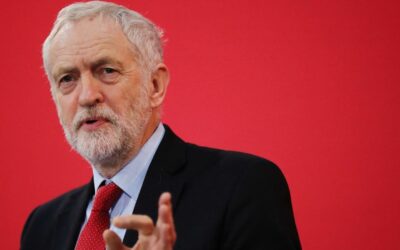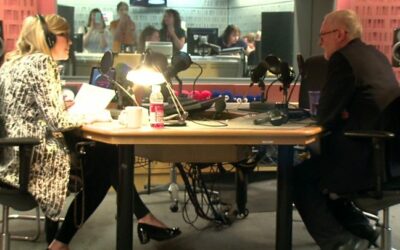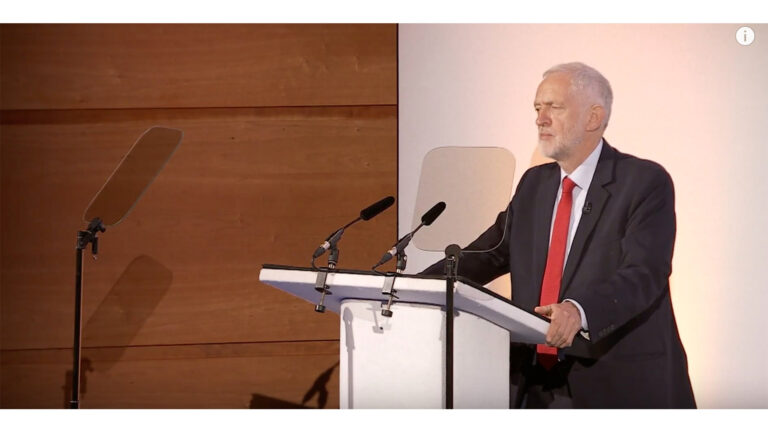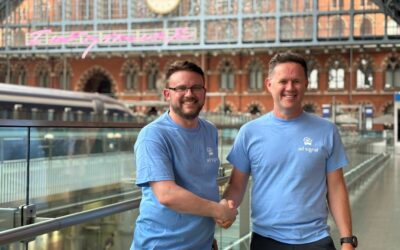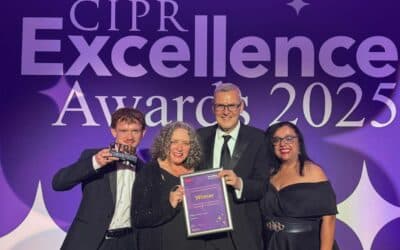Jeremy Corbyn has delivered a speech at the Edinburgh TV Festival in which he has proposed a “digital licence fee” and an independent fund to subsidise public service journalism.
Corbyn told delegates that news reporting is a “a vital and a proud profession,” and that one of his first jobs was on the Newport and Market Drayton Advertiser, and he also chaired the National Union of Journalists’ parliamentary group.
“Too often, we take journalism and journalists for granted. At their best, journalists challenge unaccountable power and expose things that the rich and powerful would rather keep hidden. Far too often around the world, journalists pay for that with their freedom or even their lives. Fearless journalists and those who support them in their work are some of the heroes of our time,” he stated.
However, he said that despite “all the brilliant work done across its multiple outlets and platforms, the British media isn’t ready for the challenges of the 21st century and so cannot properly serve the interests of a truly democratic society.
“We need to accept some home truths about the British media.
“While we produce some fantastic drama, entertainment, documentaries and films, when it comes to news and current affairs, so vital for a democratic society – our media is failing.”
He pointed to statistics from the European Broadcast Union which showed that British people “simply don’t trust the media.”
“At least our TV news operates under some basic rules ensuring an element of balance. We felt this keenly during the General Election campaign last year. When additional election rules on political balance kicked in, broadcasters were required to report the Labour Party in our voice effectively for the first time for two years so we could properly lay out our policies for the country. It turned out, to the surprise of much of the media, that our ideas are pretty much the common sense mainstream and it was the establishment gatekeepers who were shown to be out of touch,” he continued.
“Preconceptions of editorial staff could still be spotted in less regulated vox pops which were more slanted against us. A vox pop looks unfiltered but what makes it onto TV or radio is chosen by editors on the day.”
Turning to printed media, he added:
“A free press is essential to our democracy, but much of our press isn’t very free at all. And, as I’ll lay out in a bit more detail, I want to see journalists and media workers set free to do their best work, not held back by bosses, billionaire owners, or the state.
“We must have this debate now. We must get to the bottom of why our news media is failing and work out what we can do about it.
“For all the worry about new forms of fake news we’ve ignored the fact that most of our citizens think our newspapers churn out fake news day in, day out.”
He continued:
“This unhealthy sway of a few corporations and billionaires shapes and skews the priorities and worldview of a powerful section of the media.
“And it doesn’t stop with the newspapers, on and offline. Print too often sets the broadcast agenda, even though it is wedded so firmly to the Tories politically and to corporate interests more generally. Just because it’s on the front page of The Sun or the Mail doesn’t automatically make it news.”
Corbyn explained that he wanted to make some suggestions for how to build a “free and democratic media in the digital age.” These, he added, weren’t “yet” Labour policy.
Firstly he wants support for local, investigative and public interest journalism. He said that this should be funded by granting charitable status for some organisations, such as the Bureau of Investigative Journalism.
Corbyn paid tribute to the Manchester Evening News’ Jennifer Williams and her “The Deaths Don’t Count” investigation into homelessness.
“This type of journalism needs support and the government has a role in helping develop a business model to strengthen and underpin it,” he said.
In order to fund this type of journalism, he said that one solution would be to “tap up” the “digital monopolies that profit from every search, share and like we make.”
Secondly, he wants a “more democratic, representative and independent BBC.”
“The BBC must not be broken up or privatised but should lead positive change, with stable, secure funding so it can drive up standards right across the sector.
“But the BBC should be freed of government control, democratised and made representative of the country it serves to help it do that.”
He is recommending a decentralising of the BBC, with national and regional boards, with elections by BBC staff and local licence fee payers.
“I commend the BBC’s move to Salford, and Channel Four is also looking at proposals to move its headquarters out of London. This should be encouraged as part of rebalancing Britain.
“A better regional balance should help the diversity of our media workers. Currently 94% of British journalists are white and 55% are men. The industry is already trying to tackle this with the Project Diamond to monitor diversity. Again, the BBC could lead the way by setting best practice with complete transparency on the makeup of its workforce by publishing equality data, including for social class, for all creators of BBC content, whether in-house or external.”
He also believes that the Licence Fee itself should be modernised, with potentially a “digital licence fee.” This would be collected from “tech giants and Internet Service Providers.”
His third suggestion is to “empower private sector journalists and audiences.”
“One of the more radical and interesting ideas I’ve heard, which limits the power of unaccountable media barons without state control, is to give journalists the power to elect editors and have seats on boards for workers and consumers when a title or programme gets particularly large and influential. Journalists at the Guardian now elect their editor by indicative ballot and there’s no reason why that precedent shouldn’t be spread more widely.”
His fourth and final idea is a British Digital Corporation:
“I want us to be as ambitious as possible. The public realm doesn’t have to sit back and watch as a few mega tech corporations hoover up digital rights, assets and ultimately our money. This technology doesn’t have an inbuilt bias towards the few. Government is standing by and letting the few take advantage of the many using technology.
“So, one of the more ambitious ideas I’ve heard is to set up a publicly owned British Digital Corporation as a sister organisation to the BBC.”
He continued:
“A BDC could use all of our best minds, the latest technology and our existing public assets not only to deliver information and entertainment to rival Netflix and Amazon but also to harness data for the public good.
“A BDC could develop new technology for online decision making and audience-led commissioning of programmes and even a public social media platform with real privacy and public control over the data that is making Facebook and others so rich.
“The BDC could work with other institutions that the next Labour government will set up like our National Investment Bank, National Transformation Fund, Strategic Investment Board, Regional Development Banks and our public utilities to create new ways for public engagement, oversight and control of key levers of our economy.
“It could become the access point for public knowledge, information and content currently held in the BBC archives, the British Library and the British Museum. Imagine an expanded Iplayer giving universal access to licence fee payers for a product that could rival Netflix and Amazon. It would probably sell pretty well overseas as well.”

